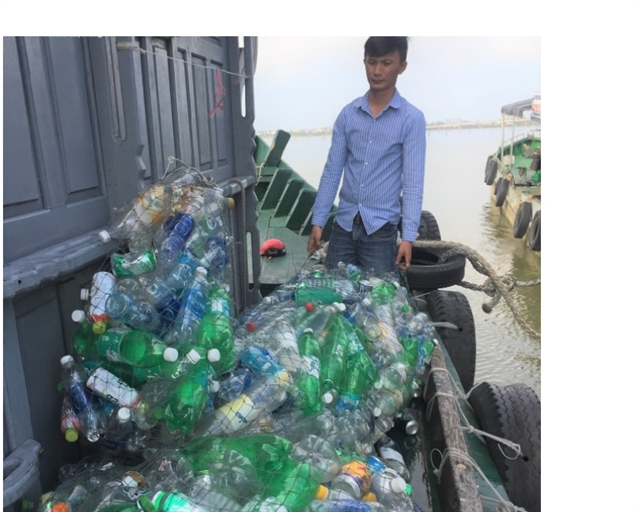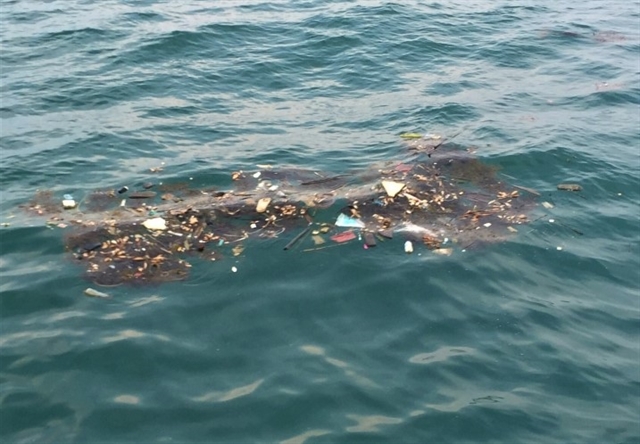Vietnam’s ‘crazy guy’ aims to save ocean from waste

SAVIOUR OF THE SEAS: Trần Văn Cường always spares a place on his boat for collected plastic waste. — Photo vtc.vn via Viet Nam News/Asia News Network
HANOI — Every time he goes out to catch seafood, Trần Văn Cường, from Phú Vang District, Thừa Thiên Huế Province, collects plastic cans, bottles and bags to raise money for poor students, while contributing to the protection of the ocean.
Over the past 20 years, whenever Cường went fishing, he saw a lot of rubbish in the sea.
“I thought that if garbage was dumped into the sea, sooner or later the environment would be polluted, and the source of fish and shrimp would gradually become exhausted. So, I decided to pick it up and put it on the ship and carry it ashore. I have done this for many years,” said Cường.
Endlessly picking up the ocean rubbish has earned him the nickname ‘crazy guy’. But he doesn’t think he is crazy at all.
For years, Cường has had the idea of using recycled plastic waste to build flood-proof boats to give to the poor, and thereby giving people a sense of protecting the marine environment and a means of transport in the flood season.
Article continues after this advertisement“Now, there are not as many fish and shrimp as before. About 50 percent is seafood, the remaining 50 percent is garbage. On many trips to the sea, we pick up more trash than fish,” Cường said.
Article continues after this advertisementIn recent years, the problem of plastic waste at sea in Thừa Thiên Huế has decreased but not significantly.
“The situation of plastic waste has lessened due to the effect of the ‘Green Sunday Movement’ launched by the Thừa Thiên Huế provincial People’s Committee. However, the change is not much. Many fishermen clinging to the sea like me are worried about the widespread plastic waste,” said Cường.
“Every day, people throw trash into the sea, and soon the sea surface turns into a garbage dump. As every household living near the sea does this, others follow. It’s sad to see this. Garbage on the shore could be treated by faster, easier ways such as placing public rubbish bins in convenient areas on the beach. Sometimes, volunteer groups come to clean up the trash. But with garbage floating in the sea it comes to an end.”
In the rainy season, when ships can’t go to sea, there is no one to collect the waste. So after every flood, garbage drifts ashore and piles up. Many tourists are not conscious of preserving the environment, so garbage on the beach is a huge problem.
If this situation continues, it will not be possible to develop marine tourism, and fishermen will also have reduced incomes.

ABSOLUTE GARBAGE: Waste floating in the sea. — Photo vtc.vn via Viet Nam News/Asia News Network
Raising funds for charity
Some years ago Cường had the idea of collecting garbage in the sea and sorting it to sell to raise funds for poor children.
“At first, I collected and sorted garbage to keep the marine environment clean. Later, the number of plastic bottles accumulated after each trip to the sea and were sold to raise money for scholarships for poor children,” he said.
Cường is also the co-founder of the Club of Young Fishermen and has carried out many meaningful programmes to protect the sea.
“Since knowing that I launch the movement to collect plastic waste to recycle and sell for charity, there have been many organisations wanting to cooperate in promoting the movement of collecting plastic waste at sea,” he said.
Lê Hoành Thành, secretary of the Youth Union of Thuận An Town, said: “Currently, the Club of Young Fishermen headed by Cường aims to ensure jobs for fishermen at sea and prevent plastic trash dumping. Members of the club regularly collect waste and the members of Youth Union come to receive and sell bottles to raise funds for poor students.”
Chairman of the Thuận An Ward’s People’s Committee Đào Quang Hưng said that the model had a positive impact on the perception of Thuận An fishermen and the marine areas. Hundreds of ship owners and fishermen are more and more interested in protecting the sea.
Cường believes that there is no better solution to protecting the ocean than by improving and raising people’s awareness.

NO TURTLE POWER: Plastic waste pollution negatively affects sea life and threatens a host of marine species. AFP/VNA Photo
Living by the sea, Cường understands the suffering of people when the flood season comes. Water is everywhere, and while some people can afford transportation, many poor people, who still lack food and clothing, can’t afford boats to move around.
Cường said that that marine waste was mainly made up of light and buoyant materials, so could be recycled to design flood-proof boats. He hoped to complete the scheme this year, but for personal reasons, he has delayed until next year.
At present, Cường has worked out a detailed plan. He needs to collect a large number of plastic bottles at a gathering area for cleaning. Then, he will glue them together into a solid rectangular block with wood and iron.
He said a flood-proof boat could carry up to 300kg of goods and people, allowing people to safely travel and transport items during the flood season.
Although it is just an idea, Cường is enthusiastic about this model. He said that a trip to collect plastic waste at sea would bring three benefits: cleaning the marine environment; raising money for charity; and creating flood-proof boats for the poor.
If ‘crazy’ people like Cường keep doing their bit to protect the sea, the oceans might just have a cleaner, brighter future.